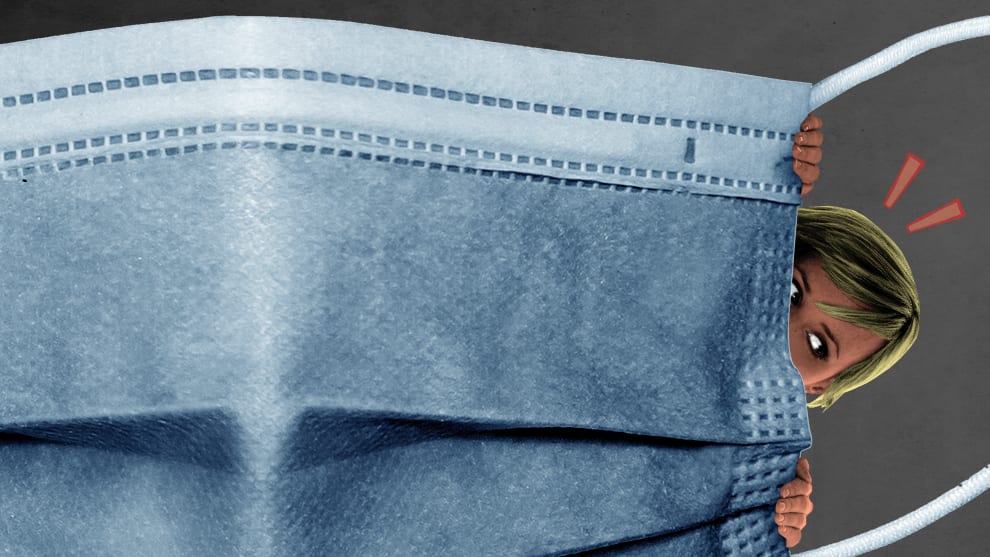This is your brain on pandemic whiplash
The CDC says the fully vaccinated are safe. But not everybody is ready to take that at face value.


A free daily email with the biggest news stories of the day – and the best features from TheWeek.com
You are now subscribed
Your newsletter sign-up was successful
A few days ago, my husband and I went to the aquarium. It was our first big excursion since reaching full COVID-19 vaccine immunity, and the first time either of us had spent more than a few minutes in an indoor public space since early 2020. As we ate lunch in the sparsely-arranged cafeteria, I pulled out my phone and began scrolling. A post from a friend caught my eye: "Wow! CDC says vaccinated people can be maskless indoors and out." I stared at the screen for a while. Then I pulled my mask back up over my face and went to bus my tray.
I suppose I shouldn't have been surprised. Even before the CDC's announcement, public discourse about masks had been getting increasingly antsy. I've been hearing more and more frequently, from friends and in media, that fully immunized people should be casting off our masks in low-risk situations, in the name of science, and to show our faith in vaccines.
I'd be lying if I said this wasn't enticing. I'm already getting increasingly comfortable going bare-faced in certain settings, especially outdoors where transmission risk has been shown to be vanishingly small. But when it comes to indoor interactions, particularly among strangers, I'm not rushing to jettison my masks any time soon. And I'm far from alone.
The Week
Escape your echo chamber. Get the facts behind the news, plus analysis from multiple perspectives.

Sign up for The Week's Free Newsletters
From our morning news briefing to a weekly Good News Newsletter, get the best of The Week delivered directly to your inbox.
From our morning news briefing to a weekly Good News Newsletter, get the best of The Week delivered directly to your inbox.
A recent piece in The Atlantic characterized this hesitancy, particularly among liberal Americans, as "[leaving] scientific evidence behind." I've heard similar arguments even within my politically progressive social bubble. And though I don't disagree that one's opinion on masking can be a proxy for political identity, politics does not occur in a vacuum. It springs from our core values; it's how we orient our moral compass. And for those of us whose political values have so far guided us to wear masks in public, the CDC's new guidelines offer plenty of reasons for pause.
For starters, we know that wearing masks prevents disease transmission. That's a scientific fact, even if preventing that transmission is a matter of less urgency now. The vaccines against COVID-19 are stunningly effective on a broad scale, yes, and that is reason enough for everyone who can get vaccinated to do so. But the CDC itself acknowledges that there will be "breakthrough infections" — people who contract the virus despite being vaccinated — and that we still don't know how well the vaccines work for people with compromised immune systems. Plus, there are millions of Americans who cannot be vaccinated yet even if they want to, including (as of this writing) children under the age of 12.
Even beyond this, nothing about the science of COVID-19 — let alone how that science has been packaged for public consumption — is straightforward. Just days before the CDC relaxed its mask guidance, The New York Times reported that the agency's publicly shared data around outdoor COVID-19 transmission was misleading, making the risk seem far greater than it actually was. And while this is good news for those eager to go mask-less outdoors, it does nothing to lessen the confusion from a year's worth of conflicting CDC recommendations and abrupt U-turns.
Vaccine efficacy rates cannot capture other public-health risks, including racism and white supremacy, that linger over the decision to mask. Even in the relatively liberal Bay Area, I have Asian American friends who have voiced fears about wearing masks in public, because it makes them visible targets for abuse. Black Americans, too, have been brutalized for wearing masks in public places. The CDC's guidelines assume that those who prefer to wear masks in public will continue to do so. But when mask-wearing becomes an exception rather than a norm, it pushes those who are already othered and vulnerable, who have already borne the brunt of the pandemic's impact — including people of color, as well as disabled people and the chronically ill — even farther to the margins.
A free daily email with the biggest news stories of the day – and the best features from TheWeek.com
There is trauma here, too. Real trauma. The past year has been grueling for millions of Americans. We've lost loved ones and gotten sick ourselves; we've faced job loss and economic instability; we've dealt with mental-health crises, both new and escalating; we've been isolated on a grand scale, cut off from so many of our core social connections and rituals. We have not even begun to reckon with the massive, individual and collective trauma that this pandemic has wrought. It will take years, lifetimes, maybe even generations to metabolize.
The past few months have caused some particularly spectacular whiplash. We've gone from tightly restricted vaccine tiers to rapidly opening eligibility within a matter of weeks. I started 2021 watching case counts soar in my county, fully expecting to stay isolated indefinitely. Less than half a year later, I'm fully vaccinated and eating lunch in an aquarium cafeteria. I'm still waiting for the other shoe to drop.
Ultimately, the decision about whether to get back to our "normal" behaviors — including going mask-less in public places — comes down to trust. We can trust that the COVID-19 vaccines are effective and safe; the data is clear on that. But trust in one another is a different matter. And the CDC's new recommendations rely explicitly on an honor system to which America has unfortunately shown no signs of adhering.
This is true on an individual level, as we've watched our fellow Americans fight mask mandates with violence, spit on strangers to make a point, attend parties after testing positive for COVID-19, and now, en masse, refuse to get vaccinated. With masks off, it will be even harder to tell who's vaccinated and who's lying about it — who's earned our trust and who's abusing it.
On a systemic level, too, the past year has stripped away whatever faith many of us still had in American institutions. We can't trust that we will be cared for if we get sick, or cushioned if we lose our income. We've watched our governments reluctantly crack down when COVID-19 case counts went up, then relax restrictions the moment the numbers start going down, only for them to rise again. Even the CDC, venerable as it was, has emerged from the Trump administration with its credibility fractured in some places and shattered in others.
Trust takes time to rebuild, if it ever comes back at all. I trust our government's public health recommendations a hell of a lot more coming from the current administration than the previous one; but I still don't trust them enough to leap without seeing the net.
Zoe Fenson is a freelance writer based in the San Francisco Bay Area. Her writing has appeared in Longreads, Narratively, The New Republic, and elsewhere. When she's not writing, you'll find her doing crossword puzzles in cocktail bars or playing fetch with her cat.
-
 ‘Poor time management isn’t just an inconvenience’
‘Poor time management isn’t just an inconvenience’Instant Opinion Opinion, comment and editorials of the day
-
 Bad Bunny’s Super Bowl: A win for unity
Bad Bunny’s Super Bowl: A win for unityFeature The global superstar's halftime show was a celebration for everyone to enjoy
-
 Book reviews: ‘Bonfire of the Murdochs’ and ‘The Typewriter and the Guillotine’
Book reviews: ‘Bonfire of the Murdochs’ and ‘The Typewriter and the Guillotine’Feature New insights into the Murdoch family’s turmoil and a renowned journalist’s time in pre-World War II Paris
